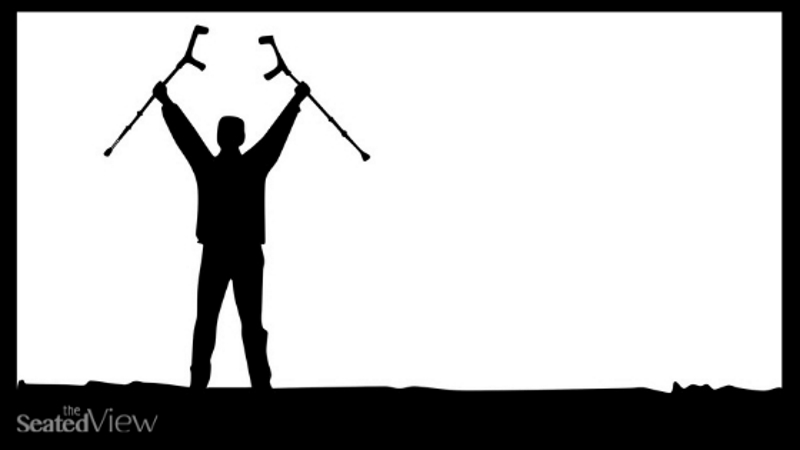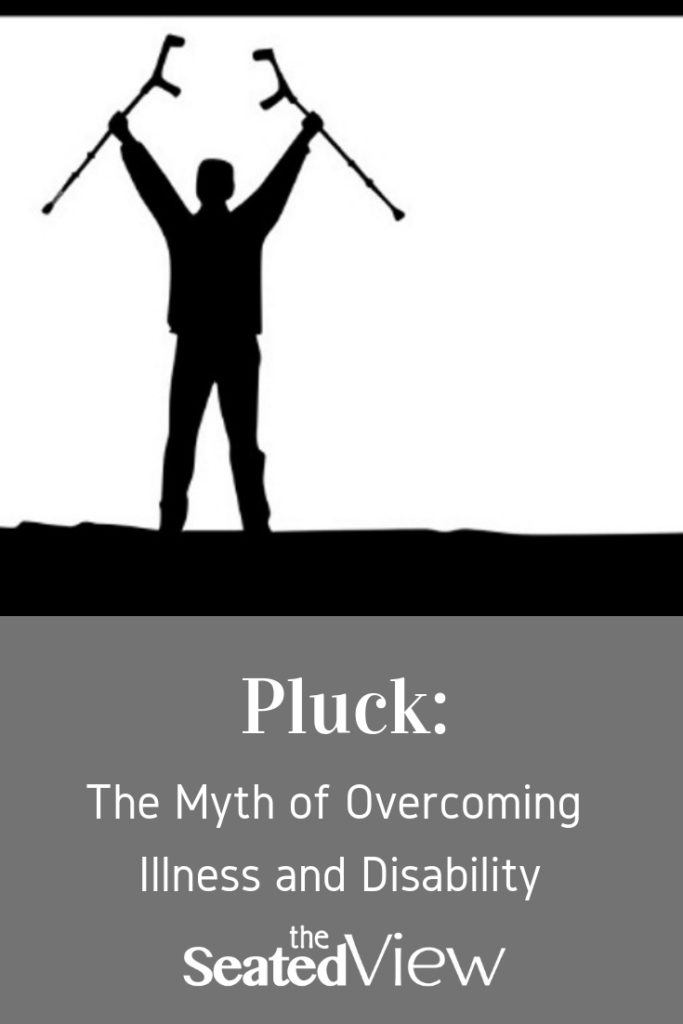Pluck: The Myth of Overcoming Illness and Disability

Updated July 14, 2024
The other day, as I was doing preliminary research for how I’d to spend my two allotted monthly credits at Audible, I came across a new release called Strong at the Broken Places: Voices of Illness, a Chorus of Hope, which looks pretty interesting. I haven’t fully made up my mind yet, but it’s on my wish list and I suspect it’ll be making its way into my library in the near future.
However, today is not about that book. Today is about the description of the book (which I originally found on Amazon US, but the specific text now only appears on the Canadian Amazon listing. Strange)
And I quote from the Book Description.
“In 2003 Cohen published Blindsided, a bestselling memoir of illness. The outpouring of support revealed to him that not only does the public want to hear from people who overcome the challenges of illness, but that in the isolated world of illness, there are people who want their voices to be heard. Strong at the Broken Places was born of the desire of many to share their stories in the hope that the sick and those who love them will see that they are not alone each” (emphasis mine).
And I got a little stroppy.

It’s a difficult line to walk, this sharing of your life when you have a serious and/or chronic condition. Because on one hand, that snippet from Amazon is right: I think a lot of us do it to shine a light on the darkness, to create a community between people who historically have been very isolated and emotionally feel alone in this state of non-health, a state that is rarely publicized because, well, let’s face it — it’s a fraught experience to share such private information? But we do it not just for each other, but for the rest of you, the able-bodied, because it creates a larger community, one in which we are integrated as just another expression of the norm, instead of being different, being The Other.
Which brings me to the reason for the stroppy: that line about the overcoming (which isn’t written by the author, so I’m not dissing him). I looked it up in the dictionary and here you go. To overcome: to defeat, to prevail over, to surmount, to conquer.
And that’s the tricky bit, because traditionally, yes, the public only wants to hear from people who “overcome” the challenges of illness. They don’t want to hear about the daily struggle unless it culminates in an achievement, unless you’re the plucky kind, preferably pretty enough to qualify for poster child status, the one who can smile through the hardship, remind the great unwashed of how lucky they are to be healthy.
And you know what? There is no overcoming of disability.
Because a chronic condition doesn’t improve, you cannot conquer it, you cannot defeat it. Rheumatoid arthritis doesn’t go away. Neither does MS, ALS, spinal cord injuries, muscular dystrophy, many types of blindness and deafness. There is only living with it, coexisting — sometimes uneasily, sometimes not. Having a disability is part of what you are, what you do. Sometimes it’s a small part and sometimes, it overwhelms the rest. But what remains is this: you live your life anyway.
And to the aforementioned great unwashed, this apparently looks like plucky overcoming and I’m not quite sure what they expect – that people with disabilities should curl up in a fetal position and whimper the rest of our days? Continually bemoan our wretched state? Off ourselves as living without walking is a fate worse than death?
The latter of which, by the by, is an act which many able-bodied people have told me would be their response to disability.
Maybe it is the long history of segregation and institutionalization that renders our experience so alien and horrifying. When a segment of the population has been hidden away — our culture’s equivalent to being exposed on a rock to die — perhaps it’s no wonder that a horrified reaction still lingers. Being taken away from society, from your family, isolated and kept apart can be a fate worse than death, can’t it? Loss of freedom is after all the punishment we inflict on criminals, it is the worst thing we can imagine. It’s no wonder that disability becomes lumped in with things that are worse than death.
And maybe I ought to be patient, to remember that deinstitutionalization only happened in the 1970s, to remember that social change takes time, and that a mere 50 years is not long enough to cleanse away the stench of being hidden. That racism still exists despite slavery being abolished 160 years ago. That sexism is still alive and well despite women being granted personhood in 1929.
But I have to admit, I’m tired of being patient. Mostly, I just want to smack the condescending idiots who get lost in the overcoming while screeching ‘snap out of it!’ But alas, that’s not a terribly effective way of hurrying change along and besides, it would probably hurt my arm.
I think that’s part of the reason why we blog and write: to remove the patina of Other. To document how, within our different experience, we are not different. And most of all, to take the language back from being filtered through the able-bodied perception of disability and illness and ensure that the voices that tell our stories belong to us.
Tag: .disability, ableism, disability terminology, inspiration porn, language
4 Comments
Read More
Discover what else I've been writing about...
















Thankyou Lene. You hit the nail on the head. Just as an aside; I've seen the pic at the top ( person triumphantly holding crutches above head), several times before. I always thought it was across country skier at the mountain top holding his skis! Until today. What do i make of that I wonder?
Probably that it’s much more common to hold skis on top of your head than crutches?
Once again you just this right in the nose. Thank you for putting such eloquent words to my thoughts.
Thank you so much for that feedback.